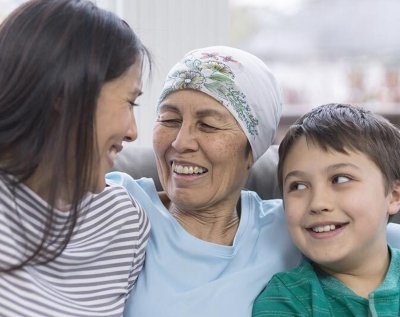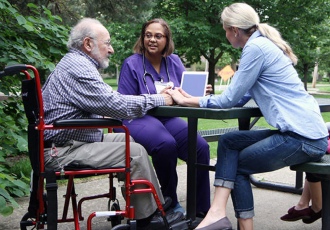By Ileana Leyva, MD, Regional Medical Director, VITAS Healthcare
Since the emergence of the hospice programs in 1982, cancer treatment has undergone sweeping changes and advancements, marked by hundreds of new cancer drugs and biologics, genetic technologies, targeted therapies, greater access to clinical trials, and massive investments in cancer treatment centers.
Compared with cancer patients 40 years ago, patients in 2022 are more likely to survive and emerge from treatment cancer free or more likely to function and live at home with cancer for months or years—a trend that presents challenges to hospice services and their focus on end-of-life care.
Today, 67% of cancer patients are survivors living at least 5 years after diagnosis, up from about 50% in the 1970s. (American Cancer Society, 2020)
Still, cancer continues to represent the most common condition for hospice services, and nearly 30 percent of all hospice patients receive care for seven days or fewer, according to the National Hospice and Palliative Care Organization (NHPCO). VITAS Healthcare, the nation’s leading provider of hospice care, feels that seven days is too little, too late, undervaluing the benefits of comfort-focused palliative care and undermining patients’ desires for a dignified, pain-free death when cancer no longer responds as hoped to curative treatment.
Download: Hospice Eligibility Guidelines for Advanced Cancer >
Against this backdrop, VITAS has updated its approach to cancer-specific palliative and hospice care. VITAS continuously provides more services, updating the data we provide to satisfy emerging standards of care for oncology certification and reimbursement. Cancer is the #1 diagnosis for hospice patients (29.6%), ranking third (behind cardiac/circulatory and dementia diagnoses) for Medicare hospice spending. (NHPCO, 2018)
Advanced Stage Cancer: Open the Door for Innovative Hospice Solutions
At VITAS, our cancer-specific solutions include:
- A team approach to cancer care, informed by a goals-of-care plan crafted by the patient, family/caregiver, and their VITAS team, which may include a physician, nurse, social worker, hospice aide, chaplain, bereavement specialist, and volunteer
- An Oncology Task Force of VITAS physicians and pharmacists who review each cancer referral and make real-time decisions about treatments and medications, based on the patient’s end-of-life goals and expectations
- Through utilizing complex modalities to address high-acuity needs, the VITAS team manages aggressive symptoms, including pain, anxiety, dyspnea, nausea/vomiting, poor appetite, constipation, weight loss, fatigue, and more.
- A specialized team that oversees individualized plans of care for home visits, goals-of-care conversations, consults, palliative care, and more.
- Optional holistic approaches that address symptoms and improve quality of life, including reiki, acupuncture, aromatherapy, pet visits, music therapy, and more
Curative: A Definition Worth Exploring
VITAS is able to continue treatments or interventions that other hospice providers might discontinue.
As a rule, all curative treatments for an advanced disease are halted once a patient is referred to hospice. But with proper documentation and justification, VITAS supports the use of medications and interventions for patients with advanced cancer if doing so:
- Provides pain and symptom relief
- Improves the quality of life
- Prevents adverse side effects or events
- Maintains awareness and cognition as death nears
For example, VITAS may continue radiation, chemotherapy, or hormonal therapy for a patient with advanced cancer by leveraging our Oncology Task Force and consulting with one of our medical directors.
Our message to cancer patients: “We can’t cure your disease, but we can address your symptoms based on what’s important to you, your family, and your quality of life.”
A Clearer Path for Cancer Specialists, Too
VITAS delivers a similar message about palliative care to cancer specialists, oncology groups, and hospitals: “While you are treating the cancer, let us address the person and their symptoms.”
And when curative treatments are no longer effective, a VITAS team handles the medical, emotional, and spiritual issues that are prevalent near the end of life. This can include management of symptoms specific to the cancer or its treatment, as well as the psychosocial effects of grief, loss of meaning, income, family role, and more.
The VITAS approach also complements industry changes in oncology certification and reimbursement. The American Society of Clinical Oncology, for example, now requires documentation of palliative care services for certification.
Likewise, other quality-of-care initiatives are tying cancer-related reimbursement to outcome measures that assess such factors as the length of time between a patient’s last chemotherapy dose and death, or the presence of advance directives in the cancer care plan. VITAS can provide both the solutions and metrics that make meeting these higher standards possible.
Hand-in-hand: Oncology Care and Hospice
Too many times, after several weeks on already delayed hospice care, cancer patients will say to me, “I wish I had received these services three months ago, or six months, or nine months ago.”
Cancer treatment, palliative care, and hospice care can and should go hand-in-hand, for the benefit of the patients, their families, and the hospitals and physicians who treat them. VITAS is well positioned as an expert and innovative partner for specialists in their treatment of patients with cancer.
Originally published January 2018 and updated July 2022.


